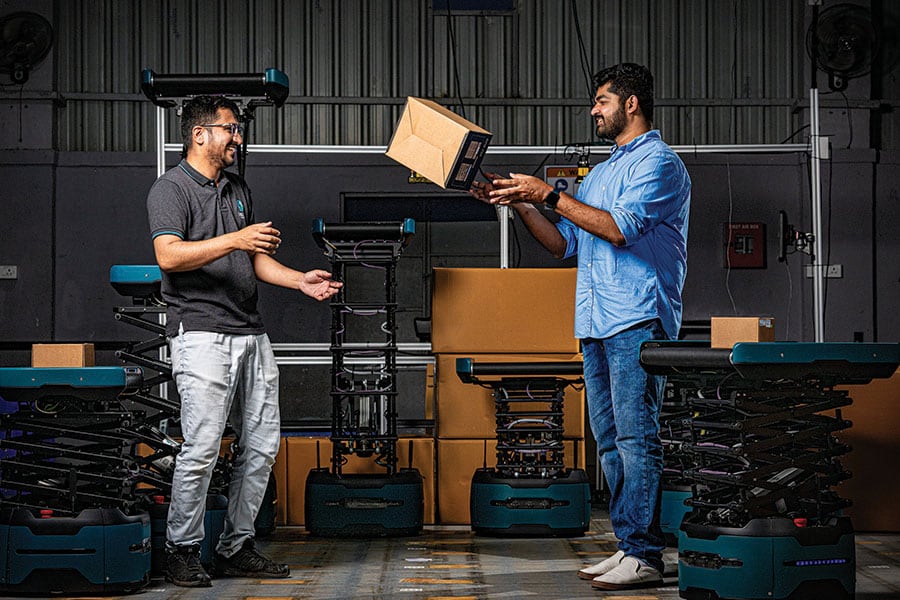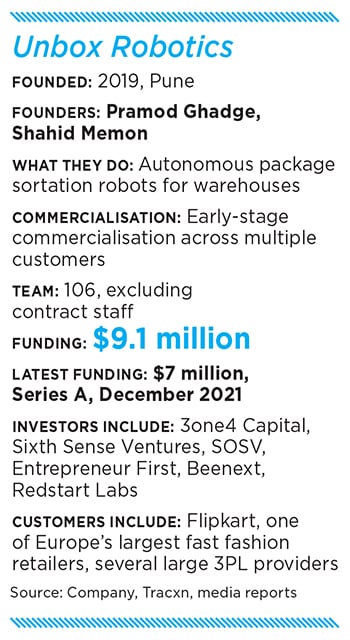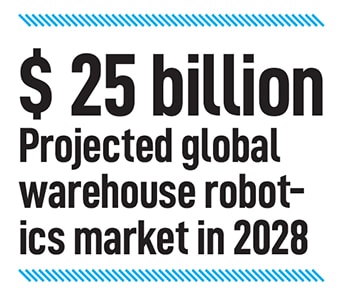
Unbox Robotics Labs: Overhauling warehouse automation
Tapping 'swarm intelligence', the robotics venture is overhauling warehouse automation
 Shahid Memon (left), co-founder and CTO, and Pramod Ghadge, co-founder and CEO, Unbox Robotics Labs
Image: Shailendra Pardeshi for Forbes India
Shahid Memon (left), co-founder and CTO, and Pramod Ghadge, co-founder and CEO, Unbox Robotics Labs
Image: Shailendra Pardeshi for Forbes India
If you’d visited Chicago’s ProMat 2023 in March, you would have found Unbox Robotics Labs at booth N9513, offering a peek into the company’s plug-and-play robotics tech for intra-logistics automation—the UnboxSort system.
Founders Pramod Ghadge and Shahid Memon started the company in 2019, initially in Bengaluru, but moved back home to Pune, after previously working at other firms, including Flipkart. “There, I was on the other side of the table,” says Ghadge, who was exposed first-hand to deploying robotics and automation for the Indian ecommerce giant’s supply chain. “I saw some opportunities in warehouse automation and that’s what we’re going after at Unbox.”
 He met Memon at Entrepreneur First, who has a formal background in robotics and computer software, complementing Ghadge’s experience in industrial and systems engineering fields in manufacturing and mechanical systems. They zeroed in on “swarm intelligence”, which mimics how ants, termites or bees cooperate with each other. Originally the concept caught the attention of biologists, and by the 90s, computer scientists were writing algorithms based on the idea. In robotics, swarm intelligence is credited to Gerardo Beni and Jing Wang, in 1989, for their work on robotic systems. Since then, swarm intelligence has evolved into a multidisciplinary field encompassing robotics, optimisation, and distributed computing. Entrepreneurs like the founders of Unbox are tapping it to build solutions to complex problems via decentralised, self-organised systems.
He met Memon at Entrepreneur First, who has a formal background in robotics and computer software, complementing Ghadge’s experience in industrial and systems engineering fields in manufacturing and mechanical systems. They zeroed in on “swarm intelligence”, which mimics how ants, termites or bees cooperate with each other. Originally the concept caught the attention of biologists, and by the 90s, computer scientists were writing algorithms based on the idea. In robotics, swarm intelligence is credited to Gerardo Beni and Jing Wang, in 1989, for their work on robotic systems. Since then, swarm intelligence has evolved into a multidisciplinary field encompassing robotics, optimisation, and distributed computing. Entrepreneurs like the founders of Unbox are tapping it to build solutions to complex problems via decentralised, self-organised systems.
The idea is that, like the insects, the robots “work independently but together and they have one goal”, Memon explains. And the outcome is a very high throughput for the specific or a fixed number of robots. When applied to sortation in warehouses and fulfilment centres, for example, these robots can stack parcels vertically, very fast, lifting packages of up to 10 kg, which account for the bulk of the parcels sorted in most warehouses. Ghadge and Memon say their system helps customers achieve a three-fold improvement in productivity, sorting accuracy of 99.99 percent and space efficiency of 50 to 70 percent.
 Also read: Bellatrix Aerospace: Of making in-space thrusters and taxis for satellites
Also read: Bellatrix Aerospace: Of making in-space thrusters and taxis for satellites
“We work with some of the largest third-party logistics providers, in India, also an ecommerce company, and one of the biggest retailers from Europe,” Ghadge says. After pilot programmes to beta-test the robots and the software system, “all of them have given next orders”, he says. They expect to go from 60 robots currently to about 400 this fiscal. And they’re beginning to expand into the US and Europe.








